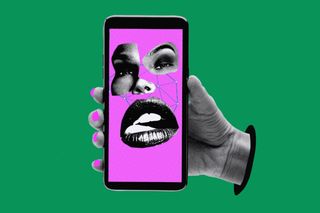
How Society Forces Women to Objectify Themselves – Impacting Their Mental Health
Presenting strategically curated, aesthetically appealing imaging images online can bolster women’s tendency to self-objectify.

Since the advent of social media, we have blamed countless women for their indiscriminate usage of beauty filters — accusing them of catering to unrealistic beauty standards, perpetuating sexist ideals, and inspiring body image issues among their female followers. In a nutshell, we declared women’s reliance on beauty filters — and, sometimes, even on conventional make-up — anti-feminist. In the process, what we missed is that the women relying on filters could themselves be caught in the throes of self-objectification, perceiving themselves “as a physical object, first; a human being, second.”
Published in Psychology of Women Quarterly, a new study has highlighted how presenting a strategically curated image of themselves on social media — by editing their images to appear aesthetically appealing — can bolster women’s tendency to self-objectify.
What nurtures the growth of self-objectification are everyday experiences, ranging from being stared at and stalked to being exposed to the objectifying male gaze in pop culture and social media. “[W]hen women are treated as objects, they momentarily view their own bodies from the perspective of the person objectifying them. In turn, they become preoccupied with their physical appearance and sexual value to others,” Peter Koval, Elise Holland, and Michelle Stratemeyer, all from the Melbourne School of Psychological Sciences at the University of Melbourne, had written in The Conversation. “Though subtle, the indirect emotional effects of objectifying treatment may accumulate over time into more serious psychological harm for women.”
According to the study, the motivation behind the tendency is rooted in people-pleasing, a rather common human instinct that is more pronounced among women. When they are conditioned into believing from a very young age that their worth is linked to their appearance — the prettier and more feminine they are, the happier they’ll make their parents, relatives, and other figures of authority in their lives — they tend to internalize the messaging.
External objectification, then, sows the seeds of self-objectification.
Related on The Swaddle:
Why Watching Porn May Make Some Women Develop More Body Image Issues Than Others
Indeed, the objectification of women in the media — in India, especially through the overt sexualization of women in item songs — has routinely drawn censure for promoting, sustaining, and even aestheticizing rape culture. In a country where women’s safety is already a major cause of concern, this is indeed a problem. But the manner in which it causes women to self-objectify — often unconsciously, much like the internalized misogyny many of us practice, but are unaware of — remains largely under-discussed. More so, in terms of its impact on mental health. “Just as passive smoking is harmful to non-smokers, second-hand exposure to sexual objectification may reduce the emotional well-being of women,” Koval, Holland, and Stratemeyer add.
At present, then, with external validation taking the form of likes, comments, and other forms of engagement by netizens on one’s social media, the impulse to self-objectify is, perhaps, more arresting than ever before. But the implications are stark: from depression, disordered eating, to reduced cognitive performance and productivity, the effects of self-objectification are far-reaching.
“[T]he internalization of sexual objectification leads to constant self-monitoring, creating a state of self-consciousness that breeds feelings of shame and anxiety… Prolonged exposure to sexual objectification may also contribute to insidious trauma which is marked by psychological trauma symptoms that occur due to lifelong exposure to microaggressions, as opposed to one large trauma,” reads an article by the New York University. “[C]onstant objectification creates a continuous stream of anxiety-provoking experiences, requiring women to maintain at least part of their concentration on their physical appearance and safety at all times in order to better anticipate the perceptions and actions of others… diminish[ing] women’s peak motivational states… [and] reducing rates of productivity and general life enjoyment.”
Related on The Swaddle:
How Shaming Women for Their Choices Breeds Lifelong Self‑Doubt
The grip of self-objectification is so resolute that women couldn’t escape it when they were forced to look at their own images for prolonged durations due to the self-view feature in video conferencing when the pandemic forced people to work from home. To an extent, this almost offset the pandemic-induced rebellion against beauty norms, ushered in temporarily by the absence of the male gaze during social isolation.
The fixation with one’s image is, perhaps, one of the many reasons why women reported feeling more fatigued from attending Zoom calls, with Fast Company even terming Zoom’s default interface “a perfect storm for self-objectification.”
On a related note, describing a symptom of self-objectification, an article states: “When looking at yourself in the mirror, you have a deep urge to fix all your physical flaws and cannot take your eyes away from them.”
Self-objectification, bred and nursed by a lifetime of external objectification, thus becomes the enforcer of gender-based oppression — preventing women from expending their available energy to their careers, or any other task at hand, and instead causing them to be caught in a vicious cycle of preoccupation with their appearance. The blame for this, too, is placed squarely on women, with society terming them vain rather often.
Self-objectification can, undoubtedly, be a tool to reclaim agency over one’s body — even empowering those who have been excluded from the normative standards of beauty. However, when this objectification is based on internalized ideals of sexism and misogyny that are impossible to miss in the largely patriarchal society we live in, often, it does more harm than good.
Devrupa Rakshit is an Associate Editor at The Swaddle. She is a lawyer by education, a poet by accident, a painter by shaukh, and autistic by birth. You can find her on Instagram @devruparakshit.
Related


TMI: People Tell Us What They Wish They Had Learned in Sex Ed
